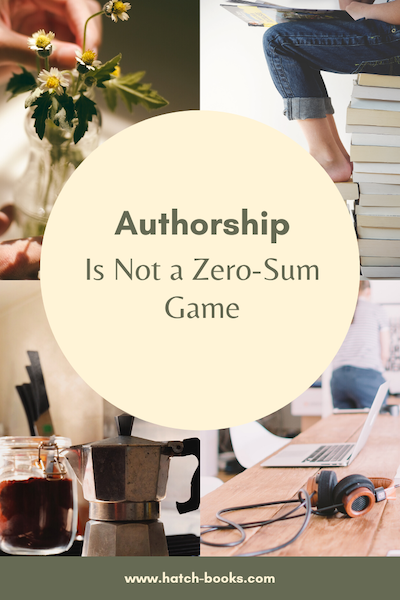I went through a rough patch in college, one in which I didn’t have many dates.
I saw everyone coupling up around me, and I hated it. One night, my roommate came back from a party, happy to tell me that she’d met someone there.
If I could go back in time, I would tell her how happy I was for her. I would give her a hug and ask for details. Instead, I spat my toothpaste moodily into the sink and said, “Great. And I’m going to die alone.”
Definitely not my proudest moment! It may seem ridiculous that I would even say that, but are you doing the same thing to your writing friends?
What is a “Zero-Sum Game”?
In game theory, a zero-sum game is one in which one player wins or advances at the loss of their opponents. (There’s certainly more technical terminology to it, if you’re interested, but for our purposes, this definition will do.)
Zero-sum games exist in real-life, but most of them are more capitalistic than authorship. For instance, businesses compete for a client, buyers bid on a mortgage, and all but one loses out when one gets the deal.
Outside of these examples, I can’t think of many real-life experiences where a zero-sum scenario is true. Certainly not authorship.
Why Authorship isn’t a Zero-Sum Game
Authorship isn’t a zero-sum game. It just isn’t. And yet, like my embarrassing college story, we treat it that way all the time.
Think about it. When one of your writing friends wins an award or hits the Amazon bestsellers list, is your first reaction to be proud of them or to think, ‘Must be nice’? When Publishers Lunch announces a book deal for a novel with similar subject matter to yours, are you happy for the author or do you think, ‘I guess I’d better give up now’?
Both reactions are possible, but my point is that, like many things in life, success in writing takes time and practice. Some writers will blossom early, while others will be late bloomers. (If you are a late bloomer, know that you’re in good company.)
Your success or failure as an author is not predicated on the success or failure of a writing friend... or even a rival. Instead, it is predicated on your devotion to your craft, your persistence in submitting work and pitching publishing professionals, and most of all, your perspective.
Which is why I’d like to propose an alternative.
Try Literary Citizenship on For Size.
Literary citizenship is a concept put forth by Cathy Day, a creative writing professor at Ball State University. Day asserts that we as writers need to read and promote the work we believe needs to be shared with the literary world.
In other words, a rising tide lifts all boats, so be supportive of your fellow writers. When your time comes, if you’re supportive, you’ll find yourself supported, too.
And don’t be envious. If you absolutely can’t fend off the green-eyed monster, take a private moment to explore the feeling. What’s causing it? Is it truly competition or is it a false sense of diminished self-worth, a fear that you're falling behind?
Accept your jealousy, work through it, and five minutes later, do your best to put it aside. Then, keep writing.

